The story of how Diamonds for Peace, a non-profit organization, strengthened its organizational foundation.
Supporting the independence of Liberian diamond miners.
Increasing the number of supporters by improving public relations in Europe, the United States, and Japan.
NPO Diamonds for Peace

“Diamonds for Peace,” an organization that helps diamond miners. They have received grants for three consecutive years, and we spoke with them about their efforts to increase the number of supporters in the United States and Europe, where there is much interest in this issue, as well as their educational programs aimed at changing consumer behavior and future goals.
[This is a re-edited version of an article originally published in No. 383 edition, THE BIG ISSUE JAPAN (May 15, 2020).]
Mining Workers Earn Only 30,000 Yen a Year
The Money Siphoned off Is Used to Fund Conflict and Terrorism
Ms. Chie Murakami, Director General of “Diamonds for Peace,” previously worked in the field of international cooperation, including with JICA. “After receiving an engagement ring, I began researching diamonds and was astounded to learn about the problems associated with diamond mining, such as child labor, forced labor, conflict, and environmental destruction.”
As a result, she founded “Diamonds for Peace” in 2015 to explore the possibility of applying the concept of fair trade to diamonds. As a diamond-producing country, Ms. Murakami focused on the Republic of Liberia (hereafter referred to as “Liberia”) in West Africa.
“Although Liberia is in a similar situation to neighboring Sierra Leone, where the film ‘Blood Diamond’ was set during the diamond conflict, the Liberian government wanted to unionize the miners, so we decided to start by creating a model in the village of Weasua in western Liberia and then expanding the model to other countries.”
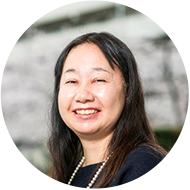
NPO Diamonds for Peace
Director General
Ms. Chie Murakami
The miners who dig diamonds by hand have a harsh life: “Their annual income is only 30,000 yen. They live in shabby houses with mud walls and use the rainforest and rivers as toilets. Wells are scarce, and some villages do not have elementary schools. Diamonds mined without a permit due to a lack of funds to renew the mining rights are purchased on the black market at the asking price of the “supporter,” who covers the cost of mining. As a result, smuggled diamonds are used to fund conflict and terrorism.”
The environmental destruction caused by mining is also severe. “Liberia is covered in lush tropical rainforests, but there are man-made ponds created by diamond mining scattered throughout the forests. The ruined sites are not only unfit for farming, but they are also dangerous because malaria-carrying mosquitoes can breed there, and people can fall in and drown.”
To change this situation, “Diamonds for Peace” assists Liberian miners in breaking free from their reliance on “supporters” and becoming self-sufficient by forming and managing their own union. Simultaneously, the organization has continued to educate consumers in Japan, Europe, and the United States about the current situation and to encourage them to purchase “diamonds that are human rights and environmentally friendly in their mining, cutting, and manufacturing processes.”
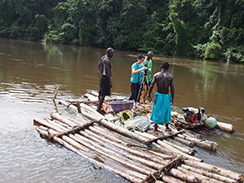
Photo Chosen Based on Consumer Feedback
Strengthening PR Activities in the U.K., U.S., and Japan
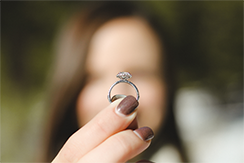
However, even in Europe and the United States, where interest in the diamond issue has always been strong, the organization received only about one inquiry per year. The number of supporters was not growing. As a result, Ms. Murakami and her colleagues decided to apply for the Panasonic NPO/NGO Support Fund in 2018 and start working on strengthening their public relations infrastructure.
“In the first year, we focused on online publicity to turn the unaware and uninterested people into potential supporters. The target demographic, as advised by a behavior modification expert in the United Kingdom, was female consumers and ethical jewelers who create jewelry using materials that respect human rights and the environment. We also attended conferences in the United Kingdom and the United States on the responsible sourcing of jewelry raw materials. Then, based on the feedback from the conferences, we rebuilt our English website with new photos taken in Liberia and advertised it on Facebook.”
In the second year, the organization focused more on offline publicity. It redesigned its English-language pamphlet to increase the number of “supporters who are active in gathering and spreading information.”
“When deciding on the cover photo, we repeatedly asked the opinions of our target audience and conducted a series of tests. There were many negative comments about the photo of the miners being reminiscent of modern-day slavery, and the bride-conscious photo was not well received. Finally, we chose a photograph that focused on a ring on the hand of a female consumer.”
We included at the end of the pamphlet a list of questions that a shopper should ask jewelry dealers when purchasing diamonds, such as “Is this diamond conflict and terrorism free?” and “Where were the diamonds mined?” “We did an undercover survey of about 30 dealers a few years ago, and not a single one could answer the question. If we can get more consumers to ask questions, I think we can change the mindset of sellers.”
She also publicized her activities by speaking at the aforementioned conferences in the United Kingdom and the United States, as well as lecturing at DePaul University in the United States. And in Japan, Diamonds for Peace, with the permission of the British producers, subtitled the short film “Voices from the Mine” in Japanese and held screening events and a film review contest. The organization has been actively engaged in educational activities, including making the film available on the website.
Sharing Stories and Generating Demand for Ethical Diamonds
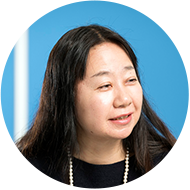
In its third year as a grant recipient, the organization is planning a “Sourced with Love” campaign that will combine online and offline activities to encourage active supporters to participate as core volunteers and donors. “The idea is to get people who already own ethical diamonds to post their stories on the site, with photos and videos, so that we can all help generate future demand among potential consumers.”
Now that the second year of grant has ended, “the number of active supporters from the United States and Europe who were not involved before the grant has increased to 14, and we receive inquiries from the United States and Europe once a month for donations and other support,” says Ms. Murakami.
Furthermore, having been able to sign an agreement with a non-profit organization that qualifies for U.S. fiscal sponsorship, future donations from the United States are expected to be income tax-deductible. This contract is yet another result of the English-language website being rebuilt during the grant's first year.
“The Panasonic NPO/NGO Support Fund enabled us to bring in a behavior modification specialist, who taught us the value of creating target personas (user images), repeating tests, and making evidence-based decisions. We are now in the process of developing an evaluation system for our public relations and awareness activities, which will allow us to track our progress after the grant expires.”
According to a survey conducted last year among mining workers in Weasua village, nearly 90% said: “they would quit if they could find a better job elsewhere.”
“This year, with the assistance of a Liberian NGO that teaches beekeeping, we will start a side business producing honey. I believe that reevaluating the rainforest environment, which is a source of nectar for increased yields, will eventually lead to tree planting and other initiatives. With increased income and mining rights, diamonds can be sold through established channels at higher prices than they are currently. It is our hope that Liberian diamonds will soon be available on the open international market, respectful of human rights and environmental standards.”
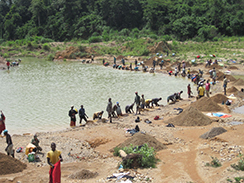
[Organization Profile]
NPO Diamonds for Peace
In 2014, It began operating as a volunteer group. In 2015, It was officially registered as a Non-Profit Organization in Yokohama City. In 2016, it was formally registered as a NPO in Liberia. In 2017, it was accredited as a national NGO by the Liberian government. The organization strives to promote unionization and self-sufficiency among African hand-digging diamond miners, as well as to encourage consumers to make ethical purchasing decisions.

